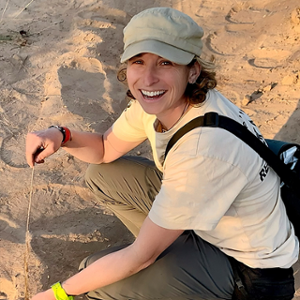Indiana University School of Public Health-Bloomington postdoctoral fellow Dr. Daniella Chusyd's latest elephant study is published in the Journal of Experimental Biology
Indiana University School of Public Health-Bloomington postdoctoral fellow Dr. Daniella Chusyd initially set out to study obesity in Asian elephants (Elephas maximus) in zoos to determine whether their weight correlated with health concerns, including low birth rates. What she and her colleagues learned was that the elephants carry only small amounts of fat – less fat (as a proportion of total body mass) than the average human. Until this study, which appears in the Journal of Experimental Biology this month, no one had measured fat in zoo elephants.
"I was interested in discovering whether methods predominantly used in human health research could help us learn more about elephants," says Dr. Chusyd. "I then realized, we can also learn from elephants to improve human health. It's a win-win."
To calculate the elephants' fat levels, Drs. Chusyd, Janine Brown, from the Smithsonian Conservation Biology Institute, and Tim Nagy, from the University of Alabama at Birmingham, measured the amount of water in the elephants' bodies, which they then subtracted from the body mass. The best way to measure body water is to give the animal a dose of "heavy water." Blood samples were collected the day before and then several times after the dosage to track the quantity of heavy water in their bodies. Dr. Chusyd then analyzed samples with support from Drs. Catherine Hambly and John Speakman at the University of Aberdeen, UK.
By calculating the animals' body water and fat content, they found that males carried, on average, slightly less fat (~8.5%) than females (~10%), although the males were larger and carried more total body fat. Overall, the females' body fat ranged from 2% to 25%. In healthy humans, the average is 6–31% fat. Dr. David B. Allison, Dean of the School of Public Health-Bloomington, and IU biostatisticians Lilian Golzarri Arroyo and Stephanie Dickinson compared the females' fertility and learned that the infertile females carried the least fat, similar to the disrupted fertility cycles in underweight female humans.
"This project really made me aware of how similar elephants and humans are, behaviorally, socially, their life history strategies, so as I continued to learn about elephant physiology, the more I saw the potential to not only further elephant welfare and conservation, but to leverage the elephant to improve human health," says Dr. Chusyd. "We now have multiple projects in the works that will focus on evolutionary biology and aging, studying the elephant to inform on the variation we see in healthy human aging. It is really transformative and exciting."
Dr. Chusyd has been studying elephants since 2012, both in captivity and in the wild. Her research has taken her throughout the U.S. and Canada and across the globe.
To learn more about the elephant study, visit https://jeb.biologists.org.


